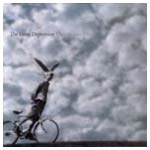

The Great Depression
Unconscious Pilot
(Fire Records)
Although they hail out of the Minneapolis, the music of The Great Depression sounds straight out of the UK. Perhaps the windswept, frozen plains of the midwestern state during wintertime helped contribute to their sound, but they channel everyone from a slightly more bleak (but not in a bad way) Stone Roses to passages by Echo And The Bunnymen. Their influences aren't worn directly on their sleeves, and slight other bits filter into their sound (perhaps by way of all the different artist sessions that group members sat in on during the 2-year recording of the disc - including everyone from Son Volt to Wilco, to Throwing Muses and Elysian Fields.
For a debut, Unconscious Pilot is remarkably thought-out and polished, and if anything can be said against it, it's that the group might have honed things a little bit too much (more on that later). The release opens with the gorgeous "The Baltic Sea," an appropriately rising and falling track that swells with deep swaths of low-end and soaring vocals all over layers of keyboards, strings, and guitars. "Two Is Fine" strips things and rocks them up a little bit, offsetting straightahead verses with soaring two-part choruses.
The rest of the album tries out a variety of styles, but everything stays within that world of overcast skies with the hint of an ocassional sunbeam. "The City By Ultralight" is a murky instrumental that mixes pitter-patter drum programming with a heavy bassline and a sprinkling of piano and guitar. At over 8 minutes long, "Meet The Habsburgs" comprises about one-fifth of the entire album runlength, but it unfolds so nicely in the middle of the disc that it makes some of the shorter tracks feel inadequate.
Because of the triumphant horns, the opening of "The Sargaso Sea" sounds almost out-of-place on the release. Sounding like the polar opposite of the earlier "The Baltic Sea" (and probably meant to be that way), it careens along after the brass and delivers as one of the catchiest songs on the entire release. I know I mentioned it before, but this is definitely a cloudy-day release. It's not without a few uplifting moments, but inhabits some of the same area as the late 80s/early 90s British Rock that made you want to sing along with it while wallowing a bit at the same time.
Rating: 7.25